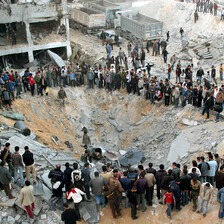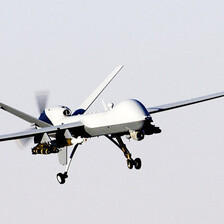The Electronic Intifada 18 March 2011
The United States Department of Commerce and the US embassy in Tel Aviv are co-promoting the Israel Unmanned Systems 2011 trade mission from 27 March to 1 April. Their partner — and the primary organizer — is Airlift, inc., an aerospace and consulting firm based in the settlement of Talpiot Mizrach (East Talpiot) in occupied East Jerusalem. This raises troubling questions about why Washington is promoting the Israeli arms trade and why it is doing so with a firm based in an illegal colony which explicitly contradicts official US policy as well as international law.
Airlift was founded in 2007 by Marc-Philippe Rudel, a French-Israeli electrical engineer and businessman, to “promote economic cooperation and the establishment of global partnerships.” The company brings foreign arms industry and military officials to Israel for arranged business-to-business meetings, specially tailored seminars, industry workshops and visits to major Israeli armament firms and research institutes. Airlift’s website states that its “offices are located in the heart of Jerusalem” but the address given puts them in occupied East Jerusalem. Airlift’s Spanish subsidiary, Airlift Iberia, was established in September 2010.
Though considered a mainstream Jerusalem neighborhood by most Israelis — including Rudel, judging by his activism in the secular liberal/centrist “Awakening in Jerusalem” movement — East Talpiot is unanimously considered an illegal settlement by the international community including the United Nations, the International Court of Justice and the US government whose pronouncements consistently oppose Israeli settlements. However, Washington regularly takes actions — such as the recent veto of a UN Security Council resolution condemning settlements — to shield Israel from international condemnation and formerly contributed economic aid that was used directly for settlement infrastructure and construction. Promoting a trade mission with a firm based in a settlement points to the latter as being more representative of US policy, in spite of official pronouncements to the contrary. American sponsorship comes at a time when governments like Norway, the Netherlands and the United Kingdom are actively distancing themselves from settlement-related businesses. Requests for comment from the US State Department and Department of Commerce were not answered.
The trade mission’s program includes visits to the facilities of several Israeli arms manufacturers deeply involved in the occupation. Israel Aerospace Industries, Aeronautics Defense Systems, BlueBird Aero Systems and Rafael Advanced Defense Systems are all on the schedule for the visiting delegation as well as an “upscale” reception at the US embassy in Tel Aviv. There will also be panels on the market for unmanned systems (drones) and an optional tour on the last day through the occupied Old City of Jerusalem.
Israel is a world-leader in the design and export of unmanned systems, especially unmanned aerial vehicles (UAVs). It also deploys them extensively in the occupied West Bank and Gaza Strip and over Lebanon. This battlefield experience, the history of deployment in service of military occupation, is a key marketing aspect for the tools. The website for the trade mission notes, for example, that BlueBird Aero Systems is an “official supplier of the Israeli Ministry of Defense and Israeli Air Force.”
There is already a history of partnerships between Israeli UAV manufacturers and American arms and aerospace firms, some of which pre-date Airlift’s founding. Boeing, AAI and General Dynamics have all signed marketing agreements to promote Aeronautics Defense Systems models in the US. General Dynamics also helps promote Elbit Systems models, and Advanced Ceramics Research and Cubic Advanced Tactical Systems formerly helped market Rafael’s now-discontinued Skylite drone. These firms and others are also engaged in research and development for their own production of UAVs. It is only the US arms industry’s UAVs, in fact, which compete with those from Israel.
This is also not Airlift’s first joint mission with the US Department of Commerce. In January 2010, they jointly organized and promoted the Israel Space 2010 Trade Mission which brought participants from Brazil, Belgium and the US to learn about and engage with many of the same arms manufacturers involved in the pending Unmanned Systems mission. Airlift regularly participates in trade and aerospace events promoted by the French, Brazilian, Canadian and other embassies. Rudel too is a consultant in charge of the aerospace industry sector for the Economic Mission of the Embassy of France.
The promoters are well aware that the same battlefield experience that gives Israeli UAVs a marketing edge is also a potential liability. A document from the 2010 Space Trade Mission available on the US Department of Commerce’s BuyUSA.gov website notes that “geo-political concerns” are “potential obstacles” to Israeli firms tapping international markets more successfully. A recent example of this was Brazil’s hesitancy in buying Israeli UAVs, as revealed by Wikileaks. The 2009 US diplomatic cable notes that Brazilian Defense Minister Nelson Jobim prepared arrangements to “prevent Brazil [from] having to buy UAVs from Israel, which had become politically sensitive” (15 January 2009 diplomatic cable, Wikileaks). With the increasing activity and popularity of the boycott, divestment and sanctions efforts aimed at ending the occupation, perhaps “potential obstacles” to future sales will prove more formidable.
Jimmy Johnson lives in Detroit and runs www.NegedNeshek.org, a news, data and analysis project researching Israeli arms exports. He can be reached at jimmy [at] negedneshek [dot] org.





